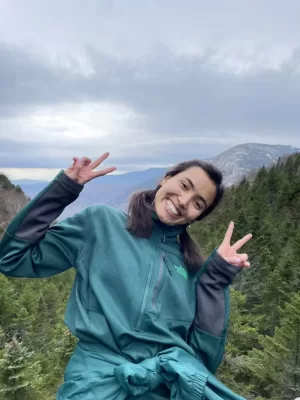Lightning in a Bottle: From Futsal in Kabul to Stargazing in Maine

Sakina Saidi ’26 isn’t one to be told “no,” and that can-do spirit has brought her from her homeland in Afghanistan, to Pakistan, where she lived as a refugee, and eventually right here to Lewiston, Maine. According to her, it all started with something we’ve all felt: the desire to play.
Sakina grew up in soccer territory and loved it from the beginning. “I was this one weird girl among all the boys watching football.” While she was welcomed to watch, there was nowhere for her to play. For girls like Sakina, obstacles that stood in the way included both cost and distance to a full-size soccer field. “I couldn’t take the risk of taking people’s daughters all the way there just to practice for 90 minutes and then come back every single day.” Sakina didn’t let that stop her. She helped found the Lightning Ladies, a women’s futsal team. Futsal is like soccer, but with half the number of players on half of a soccer field.
While the Lightning Ladies didn’t have much in the way of a budget, they did have Sakina’s determination. She found a volunteer coach who connected them to the national team for additional resources. They worked hard, practiced often, and went on to win every tournament they played. But the Lightning Ladies would soon face a challenge they couldn’t overcome — on Aug. 15, 2021, the Taliban resumed control of Kabul and reinstituted strict gender segregation. Sakina, and many of the other Lightning Ladies, were forced to flee Afghanistan.
While living as an undocumented refugee in Pakistan, Sakina helped shine a light on the realities of life in Kabul by working as a translator for an Al-Jazeera documentary about the conflict in Afghanistan. This job came at great personal risk, because of her precarious legal status. “It was a really intense situation for all of us,” she recalls. “Because we were undocumented refugees, we were continuously hiding from the police. We all had to live in one hotel room at a time.”
Balancing the demands of her work and studies with the challenges of her daily life, Sakina became the primary communicator for her family as the only one fluent in Urdu. “It was just really scary and really exhausting. We had no idea what was going to happen to us.” Despite these daunting circumstances, her decision to join the documentary team was driven by a deep commitment to bringing the stories from her homeland to a global audience. “I wanted to raise my voice and show the world what’s going on in my country,” she explains.
Sakina brings this care for advocacy with her to the Bates campus, sustained by connection to her roots. Her older sister graduated from Bates and lives in Auburn, so Sakina is never far from a comforting meal. “I am very lucky because my siblings are living just 10 minutes from here. Sometimes I just want to eat something from back home and my sisters can cook it.”
This fuels her work with the Student Center for Belonging and Community, which nominated her for the Civic Agency Fellowship. The fellowship allows student leaders to “spend their time on projects to support students’ full participation in the decisions, systems, and processes that impact their lives and communities.”
Student clubs are an important part of how Sakina, who is a double major in mathematics and physics, has connected community engagement and academics. Inspired by the Astronomy Club’s plan to travel to northern Maine for last April’s total solar eclipse, Sakina has applied her skills in robotics to create an innovative way for people to experience the eclipse through sound.
Her project is inspired by The LightSound Project at Harvard, which first developed devices for the Blind and Low Vision (BLV) in 2017, and aims to convert light into auditory signals, allowing those who are visually impaired or whose beliefs prevent them from looking at the eclipse, like her fellow club member from the Navajo Nation, to share in the awe of this natural event. “If they can’t see the eclipse they can hear it!” Sakina’s project demonstrates a profound commitment to inclusivity and accessibility, underscoring her dedication to expanding the ways in which we experience and share the world.